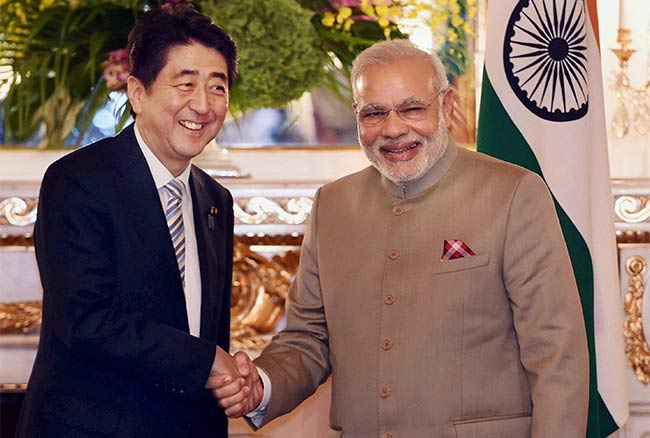
Prime Minister Narendra Modi's trip to Japan which began with a bear hug with his counterpart Shinzo Abe has yielded big results. Japan has pledged to double its direct investment to 33.56 billion dollars over the next five years in India.
Here are the 10 latest developments in this story:
Japan will give 3.5 trillion yen (over USD 33.56 billion) over five years to help finance infrastructure projects and two of the PM's pet projects - the cleaning of the Ganga and the building of smart cities. Japan will also supply financial and technical support for the introduction of bullet trains in India.
The two prime ministers said at a press conference after today's summit that they had agreed to strengthen strategic ties and would accelerate talks on the possible sale of an amphibious aircraft to India's navy.
They also agreed to speed up talks on a so-far elusive deal on nuclear energy cooperation, welcoming what they called "significant progress" in the negotiations.
"The whole world is convinced that the 21st century is Asia's century... but how this will take shape will depend on how India and Japan move forward," Mr Modi said at a press conference following the summit.
The Prime Minister met with top Japanese industrialists this morning and said, "Being a Gujarati, money is in my blood...commerce is in my blood. Businesses do not need concessions. They only need the correct environment to flourish in."
The Prime Minister did not name China in that address but his rebuke was evident when he said, "There are 18th-century-style ways and thinking that involve expanding (geographically) by taking away the land of another nation and going into seas," he said. "If Asia is to become the leader in the 21st century, Japan and India should lead" and promote a path of peaceful development, he said.
He pledged that a special team will be set up within his office to handle business proposals from Japan and offered room on this new team for two people selected by Japan.
While wooing Japanese businessmen, Mr Modi cited the 5.7 per cent economic growth accomplished in the first quarter of this financial year. Referring to the first 100 days of his government, he said, "It is a big jump. Now there is renewed hope," he said.
India and Japan have agreed to accelerate talks on a nuclear energy pact. Japan wants explicit guarantees from India, which has not signed the nuclear non-proliferation treaty, to limit atomic tests and allow closer inspection of its facilities to ensure that spent fuel is not used to make bombs. Japanese firms also want clarity on nuclear disaster compensation, especially in the wake of the March 2011 Fukushima catastrophe.
Premiers Abe and Modi also agreed to look into upgrading a 'two-plus-two' format for security talks by bringing together their foreign and defence ministers.

